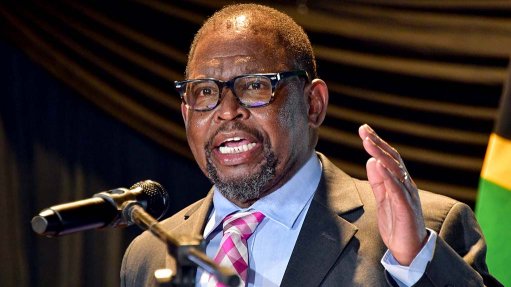
Finance Minister Enoch Godongwana
South Africa’s structural constraints must be dealt with as the country looks to spur on its economic recovery, Finance Minister Enoch Godongwana said on October 31.
Speaking during a post-Medium-Term Budget Policy Statement briefing hosted by the South African Chamber of Commerce and Industry, he said government was working to restore the health of public finances in the country.
He pointed out, however, that there were many risks, given the global slowdown.
However, Godongwana emphasised that, what the country needed to look at was not macroeconomic policies, but rather, the micro problems that were happening in the country.
In this regard, he said the biggest structural constraint facing the country was a lack of stable electricity supply.
Godongwana said that, rather than trying to fix State-owned utility Eskom, as has been the case for the past 14 years, the focus should be on getting power to the grid through all means, and fast-tracking this.
“Regardless of how good the macroeconomic policies are, without electricity, our economy will not move,” he emphasised.
Another structural constraint that needed to be urgently addressed was the country’s logistics industry, Godongwana said, with the need to fix this and bring in private sector participation in both rail and ports.
Godongwana mentioned crime as another significant constraint.
While the budget makes allowances for the recruitment of more police, Godongwana said that increasing the number of police officers would not necessarily bring down the crime rate – rather, what needs to happen is fixing the quality of police work.
Godongwana said the budget focused on what needs to be dealt with immediately, while also casting an eye into the future,
“We are confident that we will narrow the budget deficit, stabilise debt and achieve fiscal sustainability,” Godongwana assured the public.
Also speaking at the briefing was South African Breweries (SAB) CEO Richard Rivett-Carnac, who said the budget showed a resilient fiscus, with an economy in need of growth and investment.
He expanded that there was better-than-expected revenue collection, which shows that the country’s fiscal position is stronger. However, Rivett-Carnac said higher inflation was eroding buying power, leading to higher interest rates.
Echoing Godongwana’s sentiments, he noted that power cuts continued to compromise an already fragile and recovering economy.
Rivett-Carnac posited that acceleration in the implementation of energy reforms could mitigate the adverse effects of loadshedding and support greater business confidence and investment.
He also pointed out that investment was about R62-billion below pre-pandemic levels and that there was therefore a need to create a conducive environment to attract more investments into the country.
Rivett-Carnac said SAB was committed to contributing towards building the country – however, this required a conducive enabling environment, he emphasised.
In this vein, he called for excise policy and rate certainty for business planning and investment decisions.
He also pointed to the need for an alcohol content-based excise system to be applied across the full alcohol category, in line with the World Health Organisation's recommendation. This, he averred, would create consistency in the excise duty and assist in improving the tax system.
Rivett-Carnac also called for a reduction in red tape and regulatory bottlenecks, to foster growth.
He said that, despite the difficult situation at the moment, SAB was optimistic about the way government and industry has interacted over the past 18 months, with a significant shift in this regard.
He said the company was here to support in restarting the economy.